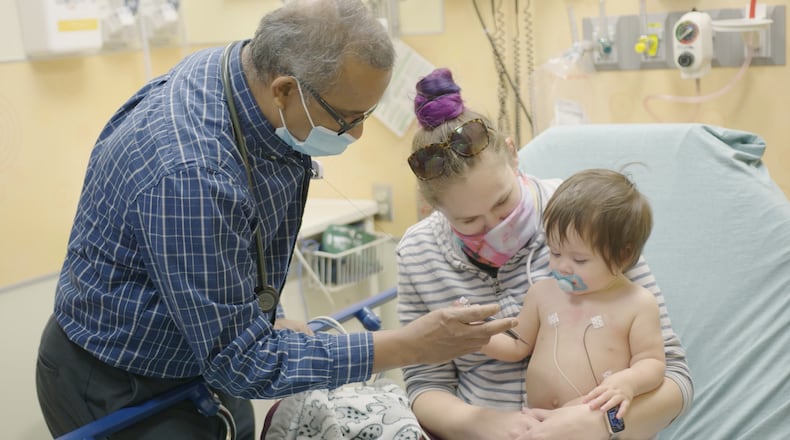“Our hospitals are full,” Mezoff said.
When cases of RSV are more prevalent is also changing, Mezoff said. Doctors typically see more cases of RSV in January and February, but instead, they are seeing a current surge in cases.
“Since the pandemic, we’ve seen the seasons of our viruses change,” Mezoff said.
RSV is a common respiratory virus that infects the nose, throat, lungs, and breathing passages.
“RSV is actually a virus that’s been around a very long time,” said Dr. Roberto Colon, chief medical officer of Miami Valley Hospital. “We see more of these viruses popping up around fall, winter time frame.”
RSV causes cold-like symptoms, so it can be difficult to tell it apart from other seasonal respiratory viruses, like the flu and COVID, although doctors can test for RSV to separate it out. Symptoms include a runny nose, decrease in appetite, coughing, sneezing, fever, and/or wheezing.
Most people recover in a week or two, but RSV can be serious for infants and older adults, according to the Centers for Disease Control. Mezoff said children are more susceptible to the illness due to not having built up an immunity response against it yet.
“The more you see this virus, the more your immune system mounts a response to it,” Mezoff said.
Nearly all children have an RSV infection before their second birthday, according to the National Foundation for Infectious Diseases. RSV can impact anyone, but those most at risk of experiencing a severe illness from the virus include:
- premature infants and infants age who are six months and younger
- individuals with chronic heart or lung disease
- individuals with compromised immune systems
- older adults who are 65 years old or older
“On top of all of this, flu season is beginning,” Mezoff said. He recommended individuals get their flu and COVID vaccinations in order to prevent severe illness.
Doctors are providing symptomatic care, and in some cases, children may be better served with their primary care doctors, at an urgent care, or at one of Dayton Children’s Kids Express locations. Children who are having difficulty breathing or are struggling with a fever that will not go away should go to the hospital.
“If you need us, we’re here,” Mezoff said.
For adults impacted by RSV, they can mainly seek outpatient care, although some doctors are seeing more severe illness with some patients who have co-morbidities.
“We did see an increase ... over the past month,” Colon said, adding that doctors expect to see more cases in the coming months.
By The Numbers
The annual impact of RSV in the U.S. includes:
• 58K: Hospitalizations and an estimated 100 to 500 deaths among children under 5
• 177K: Hospitalizations and 14K deaths among older adults
• $500M: Cost for bronchiolitis hospital admissions for children under 2
• $103M: Cost of RSV-related acute respiratory infection people 65+
About the Author


